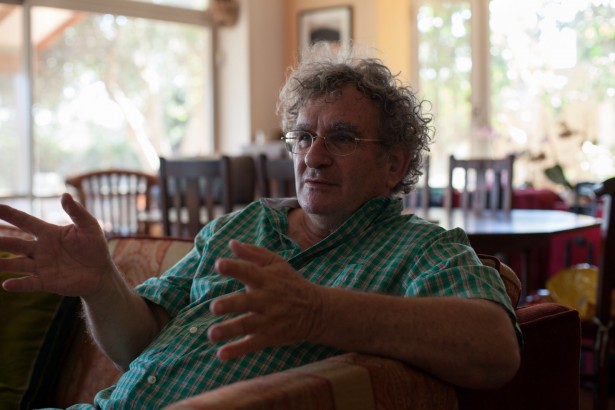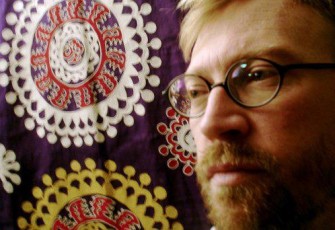 ‘There is a clash of civilisations’: An interview with Benny Morris
‘There is a clash of civilisations’: An interview with Benny Morris
Gabriel Noah Brahm
Historian Benny Morris at his home. Photo by Anna Loshkin

In this in-depth interview, Israeli historian Benny Morris speaks with Professor Gabriel Noah Brahm about his work, his critics and his regrets. He also charges Western academics with dishonesty about the Middle East, gives his prognosis for the Israeli-Palestinian conflict, and outlines his view of Israel’s place in the ‘Clash of Civilisations’.
Benny Morris hasn’t changed. One of the world’s leading chroniclers of the Arab-Israeli conflict tells the truth as he sees it, based on the facts he discerns as a historian. While some have perceived a dramatic shift from the ‘old’ (more optimistic and liberal) Morris of the Oslo period to the ‘new’ (more realistic/pessimistic) Morris of today, this is something of a myth. He hasn’t changed what he says about the reality of 1948, the Palestinian refugees, or anything else. Rather, he has added, to his knowledge of the history of Israel’s rebirth as a modern nation-state, a painful analysis of more recent history. When Yasser Arafat walked away from Israeli peace offers in 2000 and 2001, a disillusioned Morris started to examine the possibility that the Palestinians weren’t serious about wanting a two-state deal. He has since come to rate more highly the importance of Islamism and jihadism as forces driving Palestinian rejectionism.
Moreover, as a firebrand who tends to ‘call a spade a spade’, he is irked by a censorious political correctness that limits what can be talked about honestly — policing thought in line with ‘Western guilt’ over colonialism. He is equally disdainful of the romantic cult of ‘the Other’ in academia that tries to assuage that guilt. He regrets not the substance of any of the things he has said, but only the ‘intemperate’ way he expressed himself on occasion. We talked about his books and his thoughts about the future of Israel and the region at his home.
ALBERT CAMUS’S MOTHER: JUSTICE OR MORALISM?
Gabriel Noah Brahm: You’ve been both widely celebrated and also condemned by some for your work. Have you paid a price for your outspokenness and originality?
Benny Morris: I’m not sure that’s what the price is paid for. I certainly paid a price for writing things that the Israeli establishment wasn’t happy with in the late 1980s and 1990s. But The Birth of the Palestinian Refugee Problem and Israel’s Border Wars also won me a place in an Israeli university — so it cuts both ways. I was unemployed for six years — you pay a heavy economic price for that. But on the other hand, it got me a type of position that I wanted. So I’m not bitter.
GNB: Responding to critics, you once said that you respected Albert Camus’s aperçu about his mother — whom he happened to prefer, for some strange reason, to the moralising Jean-Paul Sartre’s endorsement of revolutionary violence directed at civilians in the name of a pristine concept of justice. ‘When he referred to the Algerian problem, he placed his mother ahead of morality’, you said, adding that, in your own case, by analogy, ‘Preserving my people is more important than universal moral concepts’. Haven’t morals got to be consistently applied?
BM: I’m not sure I would say ‘placed his mother before morals’. One type of moral value is wanting your mother to stay alive. And the same applies, I suppose, to the Jewish people. I think it’s a value to want to preserve your people, and that’s more important to me than some universal values which speak in terms of absolutes but don’t look concretely at what is happening.
Looking concretely is what Camus did in Algeria. He understood that the Arab struggle for independence was going to cost one and a half million colonists dearly. He thought this was going to be a tragedy and wanted some kind of rapprochement between the nationalist Arabs and the immigrants who had arrived 100 years before. It didn’t work out that way. But he thought that the Europeans in Algeria, because of the history of the place, also deserved a place in the sun.
GNB: Undiluted commitment to an abstract, theoretical idea of ‘justice’ may in fact not always be just in practice. Can it also be moral to care about one’s own?
BM: To care for your own people as well as others is not contrary to universal morality. Many people try to pose it as such, as contrary to universal ‘human values’. I think that’s mistaken. One has to look at the reality of things, and not just talk of abstract concepts which are often very difficult to apply. You may cause far more injustice by trying to apply what you call ‘justice’ than by trying to find some sort of middle way.
SEEING THE PALESTINIANS PLAIN: THE LONGEST JIHAD?
recommended by:
Leon Rozenbaum
 GNB: Your work has been hugely controversial. Looking back, would you do anything differently if you could?
GNB: Your work has been hugely controversial. Looking back, would you do anything differently if you could?
BM: To be completely honest, in the interview with Ari Shavit, in Haaretz in 2004, I should have said some things in a more temperate way. Not that I have a problem with what I said, but there were one or two phrases which provided ammunition to hostile critics . But I don’t think I have changed anything I have ever written. I would take nothing back regarding my views about 1948 or the conflict, because what I wrote originally and what I continue to write is always based on persuasive evidence.
Politically, the thing which has changed for me (and you can see that in my journalism), is my view of the Palestinians and their readiness to make peace with the Israelis. This is the crux. I would say that in the 1990s, while I was not persuaded by Arafat — the man was always a vicious terrorist and a liar — I thought then maybe he is changing his approach, because he now accepts the realities of power and what is possible.
But when it came to the crunch, when he was offered a two-state solution in 2000 by [Ehud] Barak, and then got an even better offer from [Bill] Clinton at the end of 2000, Arafat said ‘no’. And I think this was the defining moment for me. He was simply unable to reach a compromise with Israelis.
GNB: And that affected you how, exactly?
BM: From that point on, I lost a lot of sympathy for the Palestinians — and I came to understand that they are not willing to reach a two-state solution. And then there was Mahmoud Abbas’s rejection in 2008 of the Ehud Olmert proposals, which were fairly similar to the Clinton proposals of December 2000. Abbas was offered a state with 95 to 96 per cent of the West Bank, East Jerusalem, and the Gaza Strip, and he too said ‘no’.
I understood that it wasn’t really a question of a bit of territory here or there — it was a matter of the Palestinians non-acceptance of the legitimacy of the Jewish state. That was what lay behind Abbas’s inability to accept any Jewish state next to a Palestinian state. This is really what it has always been about: for Arafat, for Abbas, and before them for [Haj Amin] al-Husseini in the 1930s and 1940s.
Let me add that during the 1990s I was working on my book, Righteous Victims, in which I looked at the conflict from its origins until 1999. Before that, I had written about segments of the conflict, about the emergence of the Palestinian refugee problem and about the 1950s, but in the 1990s I devoted my time to writing a comprehensive history of the clash between the two peoples — between the Zionists and the Arab world. I came to the conclusion, on the basis of what I read about the conflict during that decade, that the Palestinian Arabs were not willing to reach a compromise. What happened in 2000 capped the conclusions I had more or less reached on the basis of the material that went into Righteous Victims. I understood that even if there were some Palestinians who were genuinely moderate and conciliatory, and willing to live with a two-state solution, they would always be out-flanked, or crushed, by the much larger segment of the Palestinians who would be completely rejectionist.
Abbas can’t reach a solution. Even if he were a real moderate, he would never sign on the dotted line. First, he would be shot by the Hamasnicks. Second, even if he wasn’t shot by the Hamasnicks, the deal would come unstuck because Hamas would send out suicide bombers and enrage the Israeli right. There are simply too many extremists; the moderates end up bowing to their will. This is what always happens when it comes to the crunch.
GNB: Was it then, a matter of a shift in focus — from a close-up look at the origins of the refugee problem, where you’re naturally feeling more sympathy for the Palestinian refugees, to the bigger picture, where it was not so easy to retain as much sympathy?
BM: Yes, maybe that’s true. The focus of my original work on the refugees, and then my subsequent book on the infiltration problem and the border wars, did look more narrowly at the Palestinians and the bad things that happened to them. And this, with any normal, decent person, would generate sympathy — so this is true. But when you look at the wider picture, you end up attributing to them a great deal of responsibility for what happened as well.
GNB: To return to the question of Palestinian rejectionism, Norman Finkelstein and Avi Shlaim have questioned the narrative you present, arguing that both the Palestinians and the Israelis did not accept the Clinton parameters.
BM: This is not true. The response by the PLO to the Clinton parameters, which was published and is on the internet, is essentially a complete dismissal of any compromise on the ‘right of return’, which is crucial—the Palestinians offered no conciliation.
On the matter of territories, they were vague and they certainly didn’t accept what Clinton outlined — 94 to 96 per cent of the West Bank, 100 per cent of the Gaza Strip, East Jerusalem — all of this is insufficient for them. The Temple Mount, where Clinton offered a number of different alternatives — Israeli-Palestinian condominium, the Arabs owning the Temple Mount surface, the Jews owning the interior — these are variations on a compromise. On these there was no give at all by Arafat.
Clinton in his autobiography, and Denis Ross in The Missing Peace, both insist that the Palestinian response was a total rejection of the Clinton parameters. Whereas Clinton said the Israeli response (which incidentally Israel didn’t publish, and the Americans never published, though most of it is in my book, One State Two States), was much, much closer to the details of the Clinton parameters. In other words, there were one or two things that Barak’s government wanted revised or re-discussed. They wanted more than 4-6 per cent of the West Bank — they wanted up to 8 per cent. But that was ‘up for discussion’. The same applied to the Temple Mount, and the sacred basin around the Old City. I don’t think Shlaim and Finkelstein are correct on this.
The Arafat response to the Clinton parameters, when a historian looks at it, is completely commensurate with the previous responses over many decades of Palestinian leaders to international and bilateral proposals for a compromise peace.
In 1937, the British Peel Commission put the first two-state solution on the table. Haj Amin al-Husseini and the Arab world (save for Prince Abdullah in Transjordan) all said ‘no’, and went back to rebelling against the British. They said ‘no’ to a peace proposal which actually gave them close to 80 per cent of Palestine’s land surface, and gave the Jews 17 per cent. But the Arabs said ‘no, we don’t want this compromise, they [the Jews] don’t deserve one inch of Palestine!’
In 1947, the international community put a second two-state solution on the table in the form of UN General Assembly Resolution 181, on 29 November 1947 — and the Arab world and the Palestinians again rejected it. That resolution offered the Palestinians something like 45 per cent of the country and the Jews 55 per cent.
Their problem wasn’t only in the percentages, which had now turned less favourable to the Palestinians. The problem was with the entire concept of partition and a two-state solution. They said all of Palestine belongs to us, and that is the only solution we will accept. And the Jews, some of them, can live here as a minority.
Essentially Arafat did the same thing in 1978, in response to Sadat and Begin’s proposal, at Camp David, of Palestinian autonomy. He did the same in 2000, with the Clinton parameters, and Abbas did the same thing with Olmert’s offer in 2008. The problem here, when you look at it as a historian, is the consistency one sees in the rejection of a two-state compromise. This is what should make reasonable people depressed.
OBSTACLES TO PEACE
read more: There is a clash of civilisations…
 Gabriel Noah Brahm is an Associate Professor of English at Northern Michigan University, where he teaches literary theory, cultural studies, and Israeli literature, a Senior Research Fellow in Israel Studies at Brandeis University, a Scholars for Peace in the Middle East (SPME) Fellow, an Israel on Campus Coalition (ICC) Center for Academic Engagement (CAE) Fellow, and a winner, in 2013, of an Israel Institute Mid-Career Faculty Development Grant. He is the co-editor (with Cary Nelson) of The Case Against Academic Boycotts of Israel . His current book project is titled Israel in Theory: The Jewish State and the Cultural Left.
Gabriel Noah Brahm is an Associate Professor of English at Northern Michigan University, where he teaches literary theory, cultural studies, and Israeli literature, a Senior Research Fellow in Israel Studies at Brandeis University, a Scholars for Peace in the Middle East (SPME) Fellow, an Israel on Campus Coalition (ICC) Center for Academic Engagement (CAE) Fellow, and a winner, in 2013, of an Israel Institute Mid-Career Faculty Development Grant. He is the co-editor (with Cary Nelson) of The Case Against Academic Boycotts of Israel . His current book project is titled Israel in Theory: The Jewish State and the Cultural Left.
twoje uwagi, linki, wlasne artykuly, lub wiadomosci przeslij do: webmaster@reunion68.com
